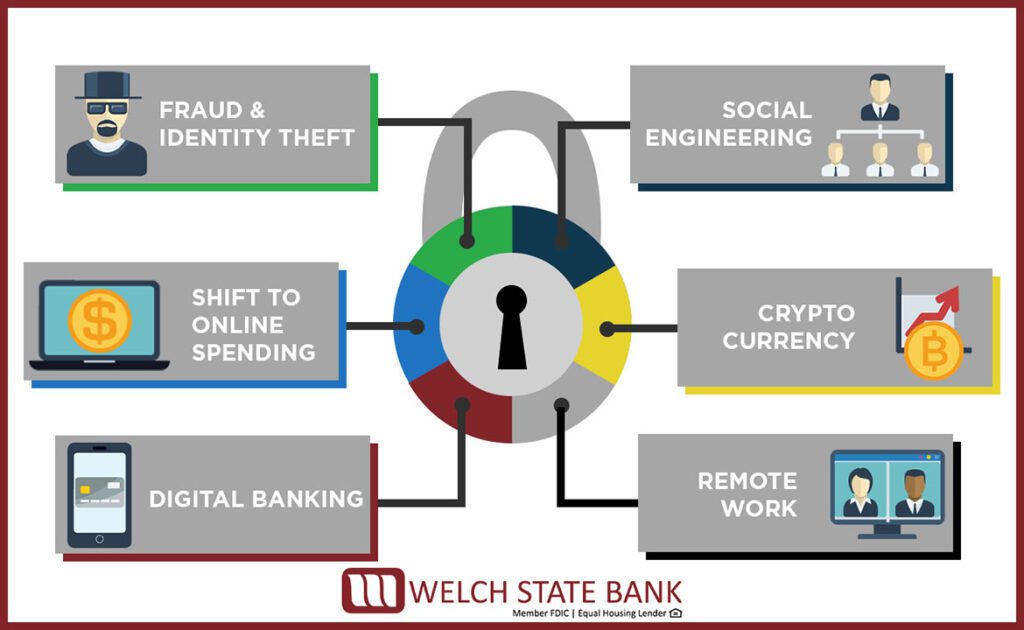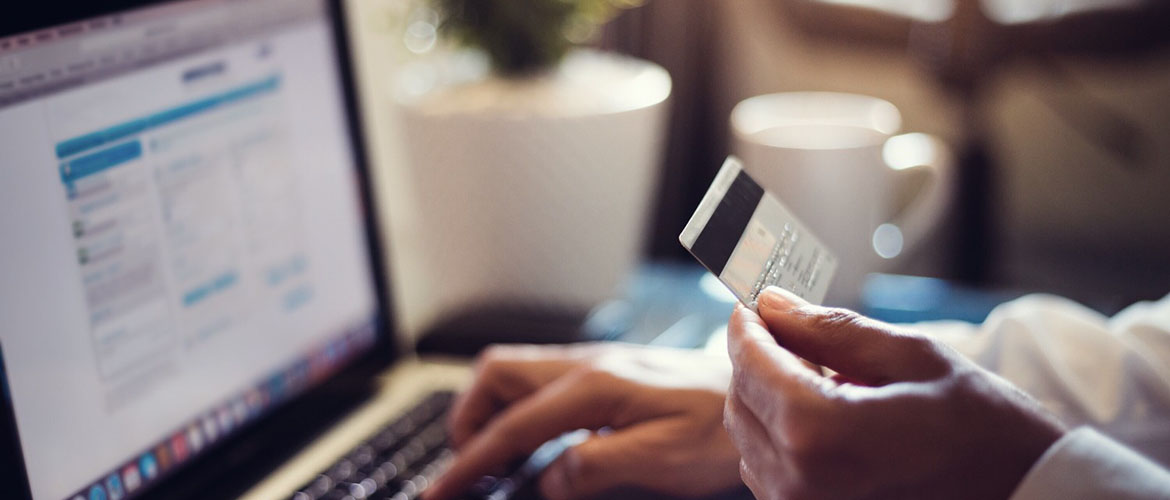The risk of cyber security attacks is increasing every year as the world becomes more reliant on the internet. The term cybersecurity refers to the protection of electronic systems such as computers and data from malicious attacks. Issues of cybersecurity have been an issue in the past, but it is continuing to rise. Here are 6 trends to consider for your protection from cyber-attacks.

Trend #1: Fraud and Identity Theft
Having your identity stolen can be scary and invasive. Not to mention, it can have horrible effects on your finances and reputation. Identity thieves access your personal information in different ways such as phishing, skimming, Wi-Fi hacking, dumpster diving, phone scams, data breaches, and tax ID theft. Fraud and identity theft have become one of the top consumer complaints, according to the FTC. Even if you choose to take steps to protect your identity, it could be sold on the dark web.
Welch State Bank is one of the many financial institutions that choose behavioral monitoring as a way to prevent fraud on your behalf. Should you be a victim of fraud or identity theft, we would encourage you to change your passwords for all accounts, close unauthorized credit cards or other bank accounts, and file a report with your local law enforcement agency. It is also crucial to freeze your credit for maximum protection.
Trend #2: Social Engineering
Social engineering refers to hacking or exploiting the end user. The Official Computer Hacking Forensic Investigator Study Guide defines Social Engineering as, “simply a means to commit fraud on another through a confidence trick or other means of disseminating false information.”
Allowing hackers to have access to personal information is not something new. New technologies have enabled cyber-criminals to sophistically manipulate and trick users online into giving up personal information. So, how can you prevent social engineering? You can prevent it by continuing to grow your security knowledge and awareness training, not oversharing on social media, and not clicking unfamiliar links or responding to phishing emails.
Trend #3: Shift to Online Spending
When was the last time you went to a store to buy something? If you are like most of Americans, the shift to online spending has been a conveniently easy one. While online shopping is more convenient, making purchases from your fingertips allows for scammers to trick buyers into paying for goods they will never receive or are not what they are expecting to receive, all under the umbrella of financial gain.
How can you protect yourself when shopping online?
- Do your homework before purchasing from e-commerce sites, researching companies and checking reviews may help you now waste money on fake e-commerce sites.
- Think before you click. If you come across an ad that encourages you to click on a link, do not click. Instead, open a new tab and start from the company’s website to see if the offer is legitimate.
- Consider what card you pay with. Using a credit card when online shopping is better than using a debit card. Credit cards offer more consumer protections, should your card information be stolen.
- Pay close attention to your bank and credit card statements so that you may be aware of any fraudulent behavior.
Trend #4: Digital Banking
As people continue to go cashless, and more transactions are completed online, our goal at Welch State Bank is to protect your assets. Our foolproof methods to protect your assets ensure your data cannot be easily breached.
Our methods include:
- We have a Card and Fraud Resource Center to help you navigate how to take action based on your situation.
- Through Welch State Bank you can set up alerts for your bank accounts such as customer spending limits, tracking card usage and transactions, as well as turning your cards off and on.
Trend #5: Remote Work
Remote work began to trend during the COVID-19 pandemic and has continued to thrive, and we don’t see that changing anytime in the near future. With that said, cybersecurity issues are plentiful when it comes to remote work. Home offices are not as secure as office sites that have secure firewalls and routers that are maintained by IT departments. Working remotely has then created new opportunities for hackers to exploit employee devices and networks.
How can you prevent cybersecurity issues while working from home?
- Ensure your Wi-Fi network is safe. Choosing to access sensitive data through unsafe Wi-Fi networks means confidential information can be easily intercepted and stolen by cybercriminals.
- Always use strong passwords that hackers will struggle with cracking, and never repeat passwords. Individuals who repeat passwords across personal and business accounts are at a higher risk of becoming a victim of a cyberattack.
- Add Multi Factor Authentication where it’s possible as it adds an additional layer of security.
- Set up a firewall to prevent unauthorized access to and from the network.
Trend #6: Cryptocurrency
Cryptocurrency is a hot topic in 2021, and investors have seen a rise in profit. The rise in cryptocurrency means added risk of cybercrimes. The trick with this form of currency is that governments and regulators haven’t figured out appropriate business and legal structures for management them. This, in turn, is how cybercriminals are able to benefit, and this form of cybercrime has become a big threat.
It is important for you to understand that not all cryptocurrency platforms are one in the same. Cyber criminals are able to hack into cryptocurrency trading platforms and steal your money. At Welch State Bank, we want to encourage you to do your research on the platform you hope to invest in. Some systems are fraudulent and do not use blockchain as a method of prevention. It is also important to pay attention to emails you get regarding your cryptocurrency. For example, hackers have been known to send emails as a way of talking to you about your cryptocurrency and needing to reset the details about your account to verify your identity.
Protecting yourself and your business from cyber-attacks is no easy feat. At Welch State Bank, we want to encourage you to take security precautions and think about the consequences of your actions online. We have your back and want to make sure that your money stays as safe as possible while in our hands.




